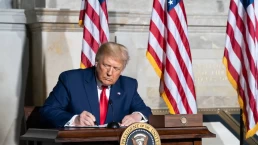Records show well-timed trades by executive branch employees and congressional aides. Even if they had no insider information, ethics experts say such trading undermines faith in government and the markets.
By Robert Faturechi, Pratheek Rebala, and Brandon Roberts, Pro Publica
The week before President Donald Trump unveiled bruising new tariffs that sent the stock market plummeting, a key official in the agency that shapes his administration’s trade policy sold off as much as $30,000 of stock.
Two days before that so-called “Liberation Day” announcement on April 2, a State Department official sold as much as $50,000 in stock, then bought a similar investment as prices fell.

And just before Trump made another significant tariff announcement, a White House lawyer sold shares in nine companies, records show.
More than a dozen high-ranking executive branch officials and congressional aides have made well-timed trades since Trump took office in January, most of them selling stock before the market plunged amid fears that Trump’s tariffs would set off a global trade war, according to a ProPublica review of disclosures across the government.
All of the trades came shortly before a significant government announcement or development that could influence stock prices. Some who sold individual stocks or broader market funds used their earnings to buy investments that are generally less risky, such as bonds or treasuries. Others appear to have kept their money in cash. In one case unrelated to tariffs, records show that a congressional aide bought stock in two mining companies shortly before a key Senate committee approved a bill written by his boss that would help the firms.
Using nonpublic information learned at work to trade securities could violate the law. But even if such actions aren’t influenced by insider knowledge, ethics experts warn that trading stock while the federal government’s actions move markets can create the appearance of impropriety. The recent trades by government officials, they said, underscore that there should be tighter rules on how, or if, federal employees can trade securities.
Recent Posts
New Addition to List of Nuclear Near Catastrophes
February 25, 2026
Take Action Now Debris flew for great distances — many times the distance of 270 meters to a nuclear reactor and nuclear storage facility.By David…
Gavin Newsom’s last budget belies his ‘California for All’ pledge
February 24, 2026
Take Action Now Yet, even as the state is poised to lose billions in federal funding, and millions of Californians are losing access to health care…
Israel and American Hawks are Pushing U.S. to Iran War With Catastrophic Consequences
February 23, 2026
Take Action Now At the World Health Assembly in May, member states may endorse an unprecedented strategy declaring that health is not a cost – but…
A Child’s View of the Attack on Venezuela. And a Peace Flotilla
February 23, 2026
Take Action Now Fabricio said that he and his family went out of their building and saw many people also going outside, running around, and kids…




